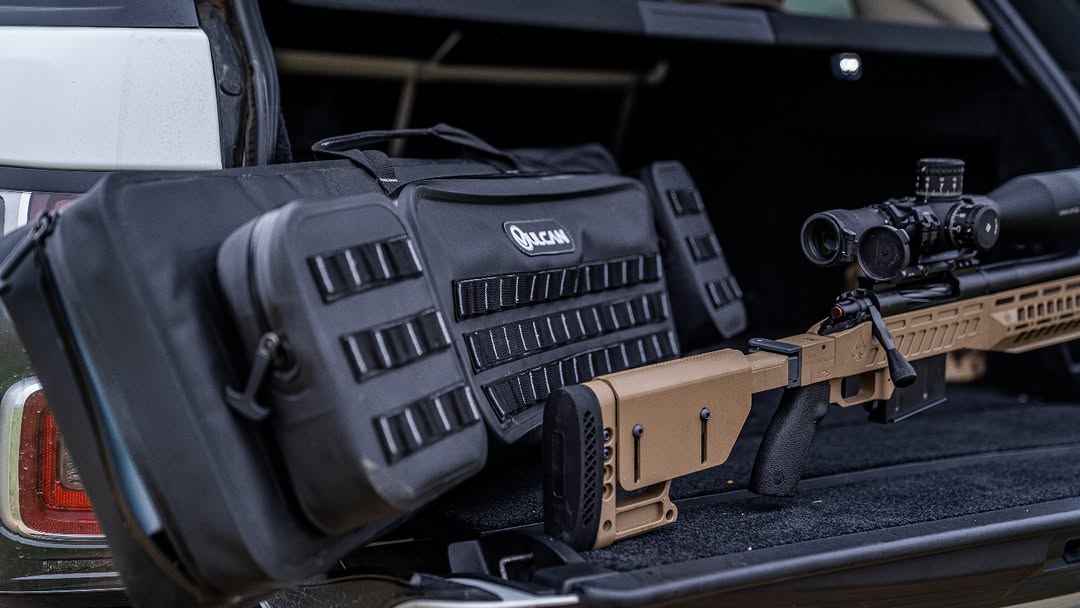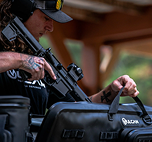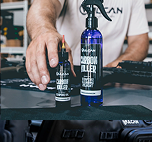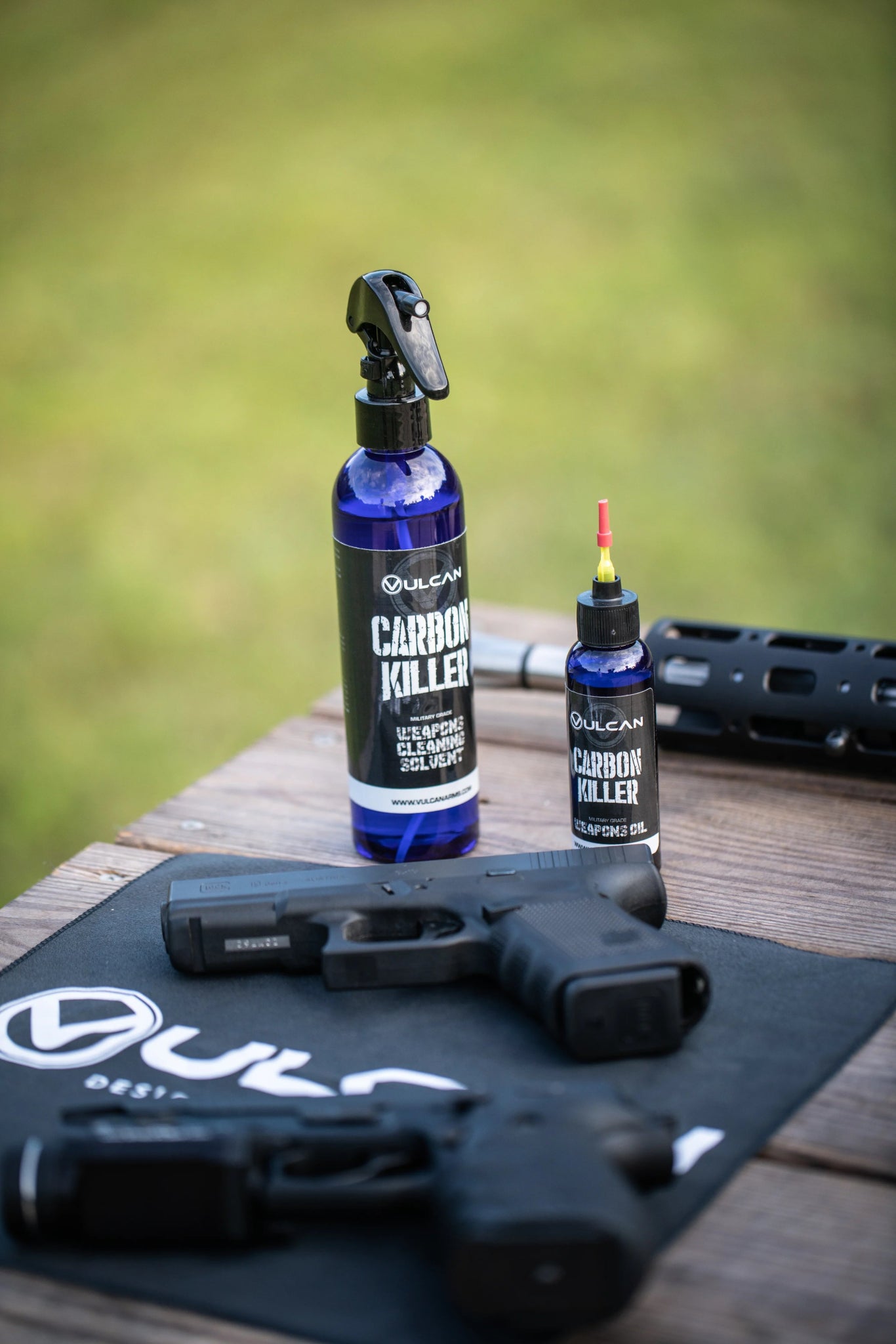As any gun owner knows, it’s critical to keep your gun clean and properly maintained. From a safety and useability perspective, you need to frequently clean your firearm. And whether you already have a maintenance routine you love or you’re just getting started, incorporating a gun cleaning solvent is non-negotiable. We’re breaking down exactly what a solvent cleaner is, why you should use one, and which is the best gun cleaning solvent on the market. Let’s jump in.

What is a Gun Cleaning Solvent?
A gun cleaning solvent is a liquid specifically designed to break down debris, residue, and carbon deposits. Each time you fire a gun, a little residue is left behind due to the combustion of the bullet’s primer and gunpowder. In some older or cheaper imported ammunition, the remaining residue from the shot can be corrosive. Higher end ammunition is typically not corrosive, but all that fouling residue buildup can affect the accuracy, reliability, and of course the appearance of the firearm. To avoid your firearm’s barrel getting clogged with carbon deposits, you can use a gun cleaning solvent to help loosen the debris before inserting your bore brush.Basically, because your gun isn't all that different from an engine or other metal machines, you need something that keeps the metal parts moving, clean and lubricated. That’s why you need a gun cleaning solvent and gun cleaning oil. The solvent breaks down all the debris, so your firearm is clean, and the oil provides a layer of lubrication to keep all the parts in working order.
What Does a Gun Cleaning Solvent Remove?
Whether you’re aware of it or not, your firearm can become very dirty very quickly. You’ll learn why using a solvent cleaner is so important, but first—what needs to be removed in the first place? Well firstly, consider the mud, blood, dirt and debris that can accumulate on the outside of your firearm if you use it to hunt or simply bring it to the range on a rainy day. A gun cleaning solvent can help remove all of that. Plus, you’ll need it to remove carbon build up from gunpowder fouling, copper fouling in the barrel, and any rust that may cause corrosion.
What are the main ingredients in firearm greases and oils?
The main ingredients commonly found in firearm greases and oils include butene, dialkyl dithiocarbamate, and lithium hydroxide. These ingredients are carefully combined to meet the specific performance requirements of firearm lubricants. For example, lithium-based greases are known for their water resistance, stability, and ability to withstand high temperatures. These ingredients play a crucial role in providing the necessary lubrication and protection for various metal components in firearms, ensuring smooth operation and longevity of the equipment.
What’s in a Standard Gun Cleaning Solvent?
Gun cleaning solutions come in different formulations, with the most common types being water-based or petroleum-based. You may also come across alternatives like alcohol or xylene based solutions. A petroleum-based solvent typically contains acetone, toluene, or heptane, which are effective in dissolving oil build-up in the barrel of the firearm. While this results in a pH neutral solution, it's important to note that these solvents can be highly toxic if inhaled.
On the other hand, water-based solvent cleaners are also available, offering lower toxicity levels. However, it's essential to understand that these cleaners are not pH neutral, often ranking around 10.5, similar to rainwater. Understanding the composition of gun cleaning solvents is crucial for maintaining the condition of your firearm. Liquid-based cleaning solutions commonly include petroleum-based solvents such as kerosene, ethanol, ammonium hydroxide, amyl acetate, and oleic acid. These ingredients work effectively in dissolving metallic and powder residue in firearm cylinders, barrels, and actions.
In addition to liquid-based solutions, aerosol-based firearm cleaning solvents are also popular. These solvents typically contain heptane, acetone, methanol, carbon dioxide, toluene, and methanol. They are designed to clean metal firearm surfaces efficiently by removing grease, carbon, oil, and dirt, leaving no residue behind.
When it comes to maintaining your firearm, using the right grease and oils is essential. Firearm oils, like Vulcan Arms Carbon Killer Oil, have a low viscosity, ensuring easy flow and are suitable for components with close operational tolerance. While choosing a gun cleaning solution, it's important to consider the potential toxicity of the ingredients. Many cleaning solutions contain harmful substances that can impact your health, such as affecting your nervous system or irritating your skin and eyes. Ensuring proper safety measures, such as avoiding contact with skin and ensuring proper ventilation, is crucial when using these products. Remember, maintaining a safe environment when cleaning your firearm is just as important as preserving its functionality and appearance.

What are the ingredients commonly found in aerosol-based firearm cleaning solvents?
Aerosol-based firearm cleaning solvents typically contain a mixture of heptane, acetone, methanol, carbon dioxide, toluene, and methanol. These ingredients are combined to create a high-pressure spray that effectively cleans metal firearm surfaces by eliminating grease, carbon, oil, and dirt. One notable characteristic of these solvents is their rapid cleaning action and quick drying process, ensuring that no residue is left behind and providing firearms with a polished appearance.What are the main ingredients of liquid-based cleaning solutions for firearms?
Liquid-based cleaning solutions for firearms typically contain a combination of kerosene, ethanol, ammonium hydroxide, amyl acetate, and oleic acid as their main ingredients. These solvents are commonly utilized for their effectiveness in cleaning firearms thoroughly. Some products may also incorporate mineral spirits, transmission fluids, and acetone along with the kerosene-based ingredients. It is essential to cross-check the ingredients listed on the Safety Data Sheets (SDS) of the solvents to understand the composition of the cleaning solution being used for maintaining the cleanliness of firearm barrels and exterior parts.Why is it Necessary to Use a Solvent Cleaner?
It only takes 250 to 300 rounds (or so) for carbon deposits to begin building up in your handgun’s barrel. Rifles, on the other hand, are even less because the more gunpowder your gun uses, the more powder is being burned. If you continue to shoot without using a solvent cleaner, you’re putting your precious weapon at risk. From improved safety and reliability to precise shooting and performance, a solvent cleaner is your gun’s secret to success. Here’s what we mean:
Safety
One of the most commons reasons for misfire results from a dirty gun. Dirt and debris buildup in the barrel can prevent a bullet from discharging safely, which can lead to major injury to you (or those around you). By using a gun cleaning solvent, you not only keep your firearm in great shape—you keep it safe, too.Reliability
Every time a bullet is fired from your gun, residual carbon particles stick to the barrel. The longer you let that residue build up, the less reliable your firearm becomes. What’s the point of using a gun as protection if it’s not guaranteed to shoot when fired?Accuracy
Think about it: When there is excess gunk lining the barrel of your gun, it’s hard for a bullet to perform the same way time and time again as the barrel continues to get fouled with more debris. A clean gun is consistent. Many precision rifle shooters have regular cleaning intervals to maintain accuracy and performance. Meaning, if you want the best precision, you need to use a gun cleaning solvent on a regular basis.Performance
Finally, a solvent cleaner will keep your firearm in perfect working condition. Using the best gun cleaning solvent on a regular basis will not only ensure your gun is good to go whenever you need it, a solvent will increase your gun’s lifespan, too. There’s no downside to using a gun cleaner—especially if it’s a non-toxic formula that protects you and your gun.When and Where Should You NOT Use a Solvent?
While gun solvents are the best way to clean up powder or copper fouling, remember that solvents work because they break down hydrocarbons and other chemicals. Cleaning solvents are great for the barrel, chamber, striker, and other metallic parts that touch ammunition, but they can dull or damage lacquer finishes and wraps because solvents are designed to remove paint. Not to mention, you shouldn’t use solvents on adhesives, fiber-optic sights, and electronic accessories (like that battery in your red dot sight).How Do You Choose a Gun Solvent?
There are a couple things to consider when trying to pick the right solvent cleaner.
The first thing to consider is the type of solvent you want to use. Do you want a foam or liquid solvent? Each has their own set of pros and cons, but here’s a quick overview:
Foam: Foam solvents are great when you are cleaning a large, broad area, like filling up an entire barrel. This is effective for extremely dirty applications, but often a bit wasteful and messy to deal with.
Liquid: if you choose to use a liquid gun cleaning solvent, you’ve got a couple of options: spray, dropper, or an open bottle. If you choose the bottle, be prepared for a potential mess. A dropper is precise but won’t cover a lot of surface area. Our favorite is a spray because of their wide reach. This type of gun solvent can get into harder-to-reach crevices, whereas foam solvents can’t. They are super easy to use and easily remove buildup.
And finally, the second thing you should consider when choosing a gun cleaner is the price. A great solvent cleaner doesn’t need to break the bank. In fact, our Carbon Killer gun cleaning spray does exactly what it’s named after, all for less than $25. No matter your budget, there is something available for you.

What’s the Best Gun Cleaning Solvent?
At VULCAN, we pride ourselves on creating the best firearm accessories on the market—and that includes gun cleaning solvents. Our Carbon Killer cleaning solvent is non-toxic, offers military grade performance, is 100% odor free, and works on all guns. If you’ve ever wondered if you can damage a gun by cleaning it, put those worries to rest. Our gun solvent doesn’t just keep your firearm looking spic and span—it maintains the functionality, too.And do yourself a favor and get our cleaning combo pack because there’s nothing better than the one-two punch of a cleaning solvent and a gun cleaning oil. The two work together to keep your firearm clean, lubricated, rust-free and protected. Get ready to up your gun cleaning routine.
Are firearm cleaning solutions toxic?
When considering firearm cleaning solutions, it's essential to weigh the options carefully. Your other alternative is a water-based solvent cleaner. These are lower in toxicity, however it's not pH neutral. In fact, many water-based solvent cleaners rank around 10.5--the equivalent of rainwater. Perhaps you see where we're going with this. If you use something to clean your gun with the same pH as rainwater, your firearm is more susceptible to rust than if you were to use a pH-neutral solvent. To avoid this, you can simply rinse the solvent off your gun once you're done cleaning. It's crucial to also be aware of the potential risks associated with traditional firearm cleaning solutions, which often contain harmful ingredients that can affect your health. These solutions may irritate your skin and eyes, pose a risk to your nervous system, and are highly flammable. Remember to prioritize safety by working in well-ventilated areas, away from flames, and wearing protective gear like chemical-resistant gloves. By understanding the potential hazards and taking necessary precautions, you can effectively maintain your firearm while safeguarding your health.









Share:
Safe Uses of a Magnetic Gun Mount & Why You Need One
Firearms Legal Protection: Everything You Need to Know